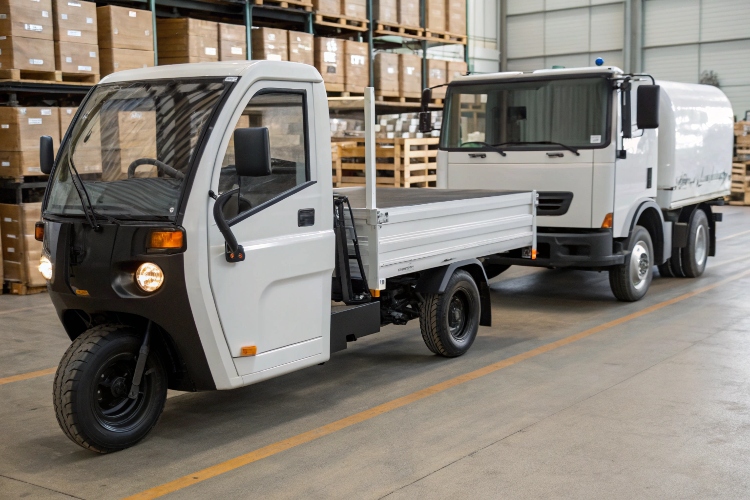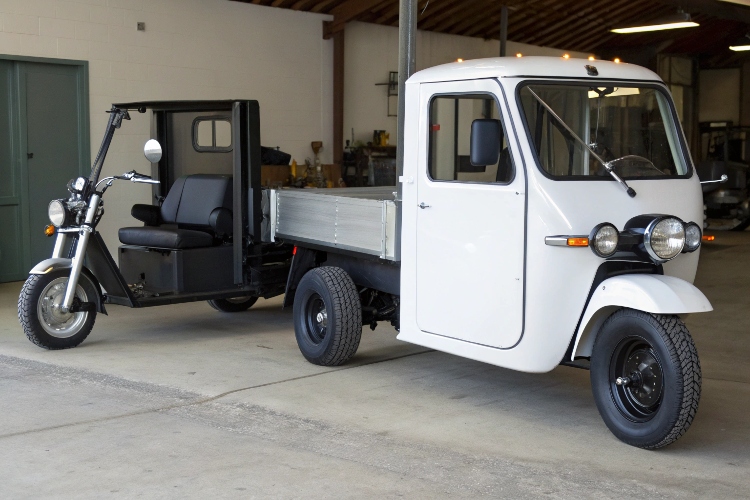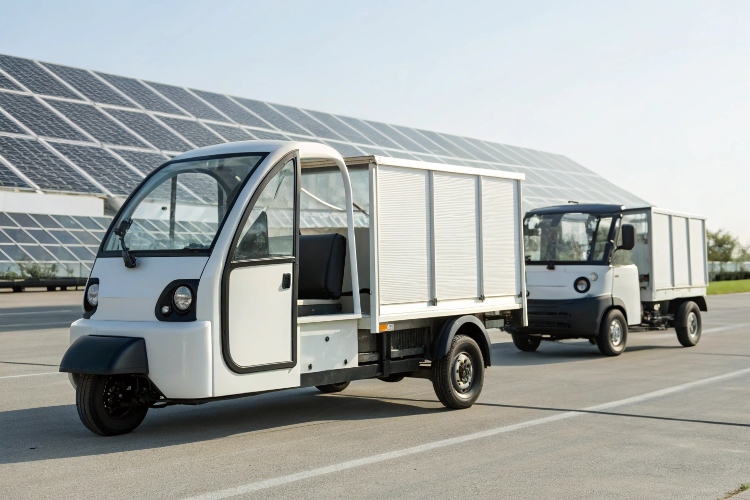Your fuel receipts are piling up, and engine repair bills are eating into your profits. You know there has to be a more cost-effective way to run your delivery or transport business, but you're worried an electric truck can't handle the daily grind.
For most commercial uses, an electric 3-wheel motorcycle truck offers drastically lower running costs and a better long-term return on investment. Gasoline models are only superior for extreme heavy-hauling or very long-distance routes.

This is the most important conversation we have with our B2B clients. The upfront price is just one small part of the story. The real cost of a vehicle is what you pay to own and operate it over three to five years. Choosing the right power type can be the difference between a profitable fleet and a fleet that slowly drains your bank account. Let's break down the numbers and performance so you can make a smart investment.
How much can I reduce my running costs with an electric 3-wheel motorcycle truck?
You see the price of gasoline fluctuate, but it only ever seems to go up. This unpredictability makes it impossible to budget accurately, and every price hike is a direct hit to your bottom line.
You can cut your daily fuel and maintenance costs by over 70% by switching to an electric truck. The savings are so significant that the vehicle often pays back its initial investment in under two years.

Let's look at a real-world Total Cost of Ownership (TCO) calculation. We'll compare two 1-ton capacity trucks, each driving 4,000 km per year.
Scenario 1: Standard Energy Costs
(Assumptions: Gasoline at $1.20/L, Electricity at $0.20/kWh, Annual Maintenance for Gas Truck at $100)
| Year | Cumulative Cost (Gasoline) | Cumulative Cost (Electric) | Your Savings |
|---|---|---|---|
| Purchase | $650 | $750 | -$100 |
| Year 1 | $994 ($650 + $344) | $910 ($750 + $160) | $84 |
| Year 2 | $1,338 ($994 + $344) | $1,070 ($910 + $160) | $268 |
| Year 3 | $1,682 ($1,338 + $344) | $1,230 ($1,070 + $160) | $452 |
| Year 5 | $2,370 ($1,682 + $688) | $1,550 ($1,230 + $320) | $820 |
Scenario 2: High Energy Costs
(Assumptions: Gasoline at $2.00/L, Electricity at $0.30/kWh, Annual Maintenance for Gas Truck at $150)
| Year | Cumulative Cost (Gasoline) | Cumulative Cost (Electric) | Your Savings |
|---|---|---|---|
| Purchase | $650 | $750 | -$100 |
| Year 1 | $1,440 ($650 + $790) | $990 ($750 + $240) | $450 |
| Year 2 | $2,230 ($1,440 + $790) | $1,230 ($990 + $240) | $1,000 |
| Year 3 | $3,020 ($2,230 + $790) | $1,470 ($1,230 + $240) | $1,550 |
| Year 5 | $4,600 ($3,020 + $1,580) | $1,950 ($1,470 + $480) | $2,650 |
The numbers don't lie. Even with a slightly higher upfront cost, the electric truck becomes cheaper in less than two years and generates massive savings over its lifespan, especially when fuel prices are high.
What are the key performance differences between electric and gasoline models?
You need to haul heavy loads, possibly up hills, and you can't afford a vehicle that isn't up to the job. You're worried an electric model simply lacks the necessary muscle.
Gasoline engines are the undisputed choice for extreme, consistent heavy loads (1.5–2+ tons) and long ranges (150km+). Electric trucks are more flexible and economical for the vast majority of commercial loads (300kg to 1.5 tons).

This is a question of matching the tool to the job. If your business is hauling gravel or construction materials weighing two tons all day, every day, a gasoline engine's raw, sustained power is what you need. But for most businesses—like last-mile delivery, food service, waste collection, or general transport—the loads are much more varied. An electric truck offers incredible flexibility. At our factory, we produce models with capacities from 300kg all the way to 1.5 tons. This allows you to buy exactly the truck you need without paying for a huge, fuel-guzzling engine you'll never fully use. Plus, the quiet, fumeless operation of an electric truck is a huge benefit for drivers and customers in urban areas.
How do repair and maintenance costs compare for both power types?
Your gasoline truck is always in the shop. The downtime costs you money, and the repair bills for the engine and gearbox are a constant headache.
An electric truck's powertrain is dramatically simpler, with almost no routine maintenance. This translates to lower repair costs, less downtime, and greater operational reliability.

A gasoline engine is a complex machine with pistons, valves, a crankshaft, a gearbox, a clutch, a fuel system, and an exhaust system. Every one of these components can fail. It requires regular oil changes, filter replacements, and spark plug swaps. An electric truck's powertrain has three main parts: the battery, the controller, and the motor. The motor itself has only one moving part. There is no oil to change, no filters to replace, and no exhaust to fix. This simplicity is its greatest strength. It means your vehicle spends more time on the road earning money and less time in the workshop costing you money. The reliability is a massive long-term value.
Which option delivers higher long-term value for commercial use?
You need to make a smart capital investment. It’s not about the cheapest price today, but the best value over the next five years.
For nearly all commercial applications with predictable routes, the electric truck's incredibly low Total Cost of Ownership (TCO) provides superior long-term value and a faster return on your investment.

When you combine the massive fuel savings, the near-zero maintenance costs, and the higher operational uptime, the business case becomes undeniable. As shown in the TCO calculation, the initial investment in an electric truck is quickly recovered. From that point forward, the vehicle is actively saving your business money every single day. Furthermore, using clean, quiet electric vehicles can improve your company's public image and may even open up opportunities in low-emission zones where gasoline vehicles are restricted. The gasoline truck is a tool for a very specific, heavy-duty job. The electric truck is a smart financial investment for the modern business.
Conclusion
Let's be very clear. If your business relies on cheap fuel, consistently hauls extreme loads, and has strict long-distance requirements, the gasoline truck is your workhorse. For all other regular commercial uses, especially with environmental goals, the electric model is the undisputed, more profitable choice.

